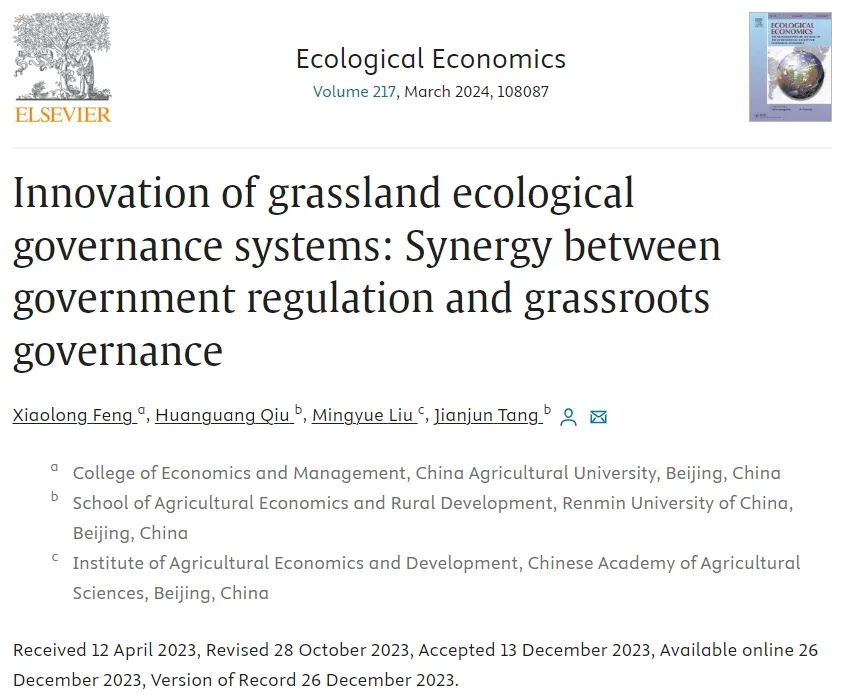Recently, a paper entitled Innovation of grassland ecological governance systems: Synergy between government regulation and grassroots governance was published in a top journal Ecological Economics (https://doi.org/10.1016/j.ecolecon.2023.108087).
This is joint research conducted by Professor Qiu Huanguang and Professor Tang Jianjun (Corresponding Author) from School of Agricultural Economics and Rural Development, Renmin University of China (RUC), Associate Professor Feng Xiaolong from College of Economics and Management of China Agricultural University (CAU), and Associate Researcher Liu Mingyue from Institute of Agricultural Economics and Development, Chinese Academy of Agricultural Sciences (CAAS).

Abstract:
Previous studies have revealed that grassroots governance has played active roles in protecting grassland ecology, however, the synergistic relationship between government regulation and grassroots governance in regulating herders' overgrazing behavior has been overlooked. Our study addresses this research gap using the fixed effects model based on a panel dataset of 711 herder households in pastoral areas of China. The findings show that the grassroots governance measures, i.e. informal institutions and punishment, can reduce overgrazing by 32.8% and 35.5%, respectively. Regarding government regulation measures, grazing monitoring by higher-level governments reduces overgrazing, in contrast to the positive effect of hiring grassland managers. We also find that grazing monitoring from higher-level governments weakens the inhibitory effect of grassroots informal institutions and punishment on herders' overgrazing; grassroots informal institutions attenuate the positive effect of hiring grassland managers on overgrazing. Hence, this study suggests that the government should be more attentive toward the coordinated development of government regulation and grassroots governance rather than dealing separately with the two.

Highlights
•The synergy between government regulation and grassroots governance.
•The establishment of grassroots governance reduces overgrazing index by one-third.
•Grazing monitoring reduces overgrazing, but hiring grassland managers increases it.
•Governmental monitoring crowds out grassroots governance institutions.
•Grassroots governance attenuates the harm from hiring grassland managers.
The main conclusions of the study were that, in terms of community autonomy, the establishment of village regulations and punishment rules could inhibit overloading and overgrazing by herding households, while in terms of government regulation, overloading and overgrazing were reduced by government overgrazing supervision. Further analyses found that government regulation weakened the inhibiting effect of village regulations and punishment rules on herders' overloaded overgrazing.
The main contributions of this study are twofold. First, it demonstrates the synergistic role played by government regulation and community villagers' self-governance in reducing herders' overloading and overgrazing, expanding the theory of environmental regulation. Secondly, it proposes to incorporate community autonomy such as village rules and regulations into the grassland ecological governance system, and puts forward an optimization path for the existing governance system dominated by government regulation, which provides a new way of thinking for effectively solving the problem of overloading and overgrazing.
Ecological Economics is listed in (23/380) SSCI-Q1 under the Economics category, and has an impact factor of 7 in 2023.


